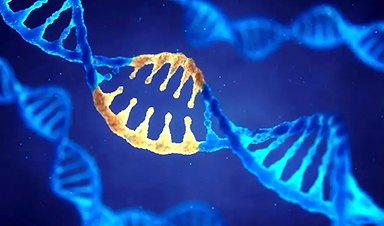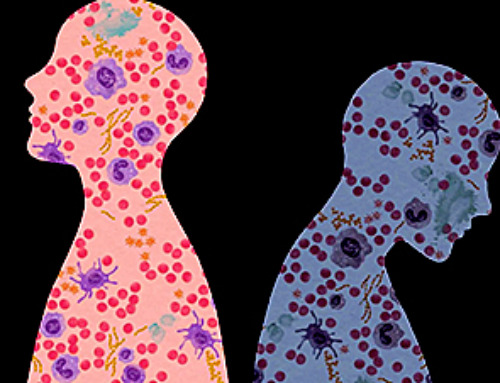Microorganisms leverage the CRISPR-Cas system as a defense mechanism against viral intrusions. In the realm of genetic engineering, this microbial immune system is repurposed for the targeted modification of the genetic makeup.
Under the leadership of Professor Dr. Alexander Probst, microbiologist at the Research Center One Health Ruhr at the Research Alliance Ruhr a research team has now discovered another function of this specialised genomic sequence: archaea – microorganisms that are often very similar to bacteria in appearance – also use them to fight parasites.
The team has recently published their findings in Nature Microbiology.

Dr. Alexander Probst. Credit: UDE/Bettina Engel-Albustin
Biochemists Emmanuelle Charpentier and Jennifer Doudna received the Nobel Prize for the biotechnological application of the CRISPR-Cas systems, or 'genetic scissors', for genetic engineering in 2020. However, many functions of this genetic tool are still unexplored to date. Could microorganisms, for example, use them to fight off other microorganisms that live on them as parasites?
With this research question in mind, Alexander Probst analyzed the genetic material of microbes in the Earth's deep crust. 'More than 70 percent of the Earth's microorganisms are housed in the deep biosphere. If we want to understand diversity on our planet, it is worth taking a look into the deep', he explains.
With his team, the microbiologist has analyzed the water that a geyser in the USA spits to the surface from the depths, as well as samples from the Horonobe underground laboratory in Japan. The research team focused on archaea, which live in the ecosystem as hosts and parasites. The tiny microbes are highly similar to bacteria in cell size but have substantially different physiological properties.
The result of their genomic analysis provided new insights: there were conspicuously few parasites in the vicinity of the hosts, and the hosts showed genetic resistance to the parasites. The researchers discovered the reason for this in the genetic scissors in the genome of the microorganisms. 'In the course of evolution, the archaea have incorporated the parasitic DNA. If a parasite with the same DNA now attacks the organism, the foreign genetic material is probably recognized by the CRISPR system and presumably decomposed', Probst explains. The microbiologist is an expert in the analysis of genetic material from environmental samples and uses the latest methods in his lab, such as Oxford Nanopore technology, which enables rapid and comprehensive sequencing of the material.
In order to rule out the possibility that they have only come across isolated cases, the researchers have extended the analysis to over 7,000 genomes and observed the phenomenon very frequently. In future research, this finding will also facilitate distinguishing between beneficial symbionts and harmful parasites. If there has been a CRISPR recognition, the microorganism is very likely to be a parasite. This will probably also help better understand important metabolic processes, such as the carbon flow in ecosystems, in the future.
Reference: "A predicted CRISPR-mediated symbiosis between uncultivated archaea" by Sarah P. Esser, Janina Rahlff, Weishu Zhao, Michael Predl, Julia Plewka, Katharina Sures, Franziska Wimmer, Janey Lee, Panagiotis S. Adam, Julia McGonigle, Victoria Turzynski, Indra Banas, Katrin Schwank, Mart Krupovic, Till L. V. Bornemann, Perla Abigail Figueroa-Gonzalez, Jessica Jarett, Thomas Rattei, Yuki Amano, Ian K. Blaby, Jan-Fang Cheng, William J. Brazelton, Chase L. Beisel, Tanja Woyke, Ying Zhang and Alexander J. Probst, 27 July 2023, Nature Microbiology.
DOI: 10.1038/s41564-023-01439-2
News
This Simple Brain Exercise May Protect Against Dementia for 20 Years
A long-running study following thousands of older adults suggests that a relatively brief period of targeted brain training may have effects that last decades. Starting in the late 1990s, close to 3,000 older adults [...]
Scientists Crack a 50-Year Tissue Mystery With Major Cancer Implications
Researchers have resolved a 50-year-old scientific mystery by identifying the molecular mechanism that allows tissues to regenerate after severe damage. The discovery could help guide future treatments aimed at reducing the risk of cancer [...]
This New Blood Test Can Detect Cancer Before Tumors Appear
A new CRISPR-powered light sensor can detect the faintest whispers of cancer in a single drop of blood. Scientists have created an advanced light-based sensor capable of identifying extremely small amounts of cancer biomarkers [...]
Blindness Breakthrough? This Snail Regrows Eyes in 30 Days
A snail that regrows its eyes may hold the genetic clues to restoring human sight. Human eyes are intricate organs that cannot regrow once damaged. Surprisingly, they share key structural features with the eyes [...]
This Is Why the Same Virus Hits People So Differently
Scientists have mapped how genetics and life experiences leave lasting epigenetic marks on immune cells. The discovery helps explain why people respond so differently to the same infections and could lead to more personalized [...]
Rejuvenating neurons restores learning and memory in mice
EPFL scientists report that briefly switching on three “reprogramming” genes in a small set of memory-trace neurons restored memory in aged mice and in mouse models of Alzheimer’s disease to level of healthy young [...]
New book from Nanoappsmedical Inc. – Global Health Care Equivalency
A new book by Frank Boehm, NanoappsMedical Inc. Founder. This groundbreaking volume explores the vision of a Global Health Care Equivalency (GHCE) system powered by artificial intelligence and quantum computing technologies, operating on secure [...]
New Molecule Blocks Deadliest Brain Cancer at Its Genetic Root
Researchers have identified a molecule that disrupts a critical gene in glioblastoma. Scientists at the UVA Comprehensive Cancer Center say they have found a small molecule that can shut down a gene tied to glioblastoma, a [...]
Scientists Finally Solve a 30-Year-Old Cancer Mystery Hidden in Rye Pollen
Nearly 30 years after rye pollen molecules were shown to slow tumor growth in animals, scientists have finally determined their exact three-dimensional structures. Nearly 30 years ago, researchers noticed something surprising in rye pollen: [...]
NanoMedical Brain/Cloud Interface – Explorations and Implications. A new book from Frank Boehm
New book from Frank Boehm, NanoappsMedical Inc Founder: This book explores the future hypothetical possibility that the cerebral cortex of the human brain might be seamlessly, safely, and securely connected with the Cloud via [...]
How lipid nanoparticles carrying vaccines release their cargo
A study from FAU has shown that lipid nanoparticles restructure their membrane significantly after being absorbed into a cell and ending up in an acidic environment. Vaccines and other medicines are often packed in [...]
New book from NanoappsMedical Inc – Molecular Manufacturing: The Future of Nanomedicine
This book explores the revolutionary potential of atomically precise manufacturing technologies to transform global healthcare, as well as practically every other sector across society. This forward-thinking volume examines how envisaged Factory@Home systems might enable the cost-effective [...]
A Virus Designed in the Lab Could Help Defeat Antibiotic Resistance
Scientists can now design bacteria-killing viruses from DNA, opening a faster path to fighting superbugs. Bacteriophages have been used as treatments for bacterial infections for more than a century. Interest in these viruses is rising [...]
Sleep Deprivation Triggers a Strange Brain Cleanup
When you don’t sleep enough, your brain may clean itself at the exact moment you need it to think. Most people recognize the sensation. After a night of inadequate sleep, staying focused becomes harder [...]
Lab-grown corticospinal neurons offer new models for ALS and spinal injuries
Researchers have developed a way to grow a highly specialized subset of brain nerve cells that are involved in motor neuron disease and damaged in spinal injuries. Their study, published today in eLife as the final [...]
Urgent warning over deadly ‘brain swelling’ virus amid fears it could spread globally
Airports across Asia have been put on high alert after India confirmed two cases of the deadly Nipah virus in the state of West Bengal over the past month. Thailand, Nepal and Vietnam are among the [...]





















